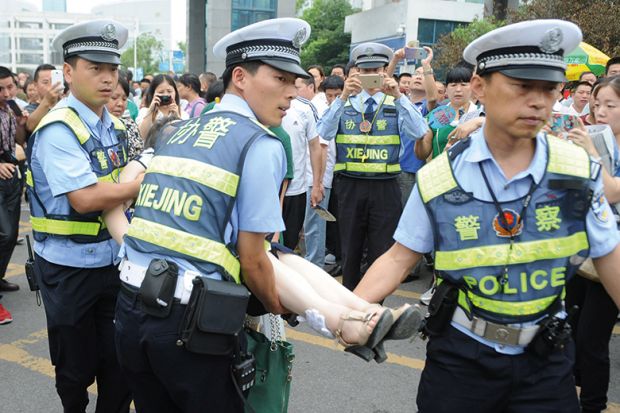“I want Britain to be the world’s great meritocracy,” said the new UK prime minister, Theresa May, in a speech on education last month. Announcing support for the expansion of selective grammar schools, she said that the UK should be “a country where everyone has a fair chance to go as far as their talent and their hard work will allow”.
An educational meritocracy, where in theory all students get an equal chance of success at school and university, is a fair-sounding system that appeals to politicians the world over.
But it took commentators little time to point out that the man who coined the word “meritocracy” actually meant it as a satirical, dystopian term for a highly unequal society justified by educational results.
Shortly before he died in 2002, Michael Young, the sociologist who wrote The Rise of the Meritocracy in 1958, argued that schools and universities “with an amazing battery of certificates and degrees” had put their “seal of approval on a minority” while demoralising the poor and disadvantaged, and branding them for unemployment.
In a way, this system is actually harsher than pre-20th century societies where rank is determined by birth, because winners in a meritocratic society believe themselves to be superior to the less qualified and enrich themselves accordingly, he wrote. The new underclass, meanwhile, is left “morally naked” in the face of failure.
Young was writing about the UK, but his ideas form part of a new book that claims a similar process has occurred in China, which is arguably the world’s biggest ostensible educational meritocracy.
There, school students have to take the gao kao, a theoretically uniform, punishing university entrance exam, with only the best winning the most coveted places.
According to Ye Liu, a lecturer in international development at King’s College London, despite huge regional disparities in access to the most prestigious universities and the strong influence of parental education on gao kao results, students blame themselves if they fail, internalising the logic of meritocracy. “They feel like they are not smart enough; they think they are inferior,” she told Times Higher Education.
Her book, Higher Education, Meritocracy and Inequality in China, details that a quarter of China’s most prestigious universities are based in Beijing – where disproportionately large quotas of places are reserved for local students – while 13 per cent are in Shanghai. “Elites try to protect their privileges through the quota system,” she argues.
Meanwhile, the scores that students need to get into university vary depending on a student’s province. This can work in favour of students from far-flung, poor western provinces such as Tibet, Liu’s analysis shows, but it also benefits those in eastern metropolises like Shanghai, Beijing and nearby Tianjin.
Nevertheless, the rural students Liu interviewed still believed in China’s gao kao meritocracy, at least until they got to university, where “things started to change” as they came into contact with much more privileged youngsters, she explains.
Lijing, a first-year undergraduate from a poor farming background, told Liu that at secondary school “all I wanted was to pass the gao kao and go to university. I was very ambitious…I was so naive then.”
Arriving on campus, she found herself living alongside students from vastly richer backgrounds, who could afford laptops when Lijing had to queue to use PCs at the university computer centre.
Her strong country accent made it difficult to communicate when presenting her projects, and her lack of connections in the city made it tricky to find work placements.
Another rural student who got into medical school – such an achievement that his village set off fireworks in celebration – found that he was a “nobody” on campus because he could not afford the lifestyle of wealthier peers.
“I don’t have real friends here. Friendship in university costs money. You need to hang out with them, drinking and eating out. I cannot afford that. I only eat in the canteens,” he told Liu.
But there is one note of hope in Liu’s analysis. She says that the importance of cultural capital in China – having the right tastes or interests – is not nearly as “extreme” as it is in the UK. While parents’ education levels had an influence on a child’s gao kao score, cultural capital such as visits to museums and ownership of musical instruments had no measurable effect – perhaps because of China’s history of vicious “anti-bourgeois” Communist Party campaigns, she postulates.
There is some east coast urban snobbishness in China, but no “Downton Abbey versus EastEnders” class divide, Liu says. Rural students may lack English or networking skills, but it is still possible to acquire them, arguably unlike class in the UK.
As there are fewer of these obvious class barriers to advancement in Chinese society, “this explains why the gao kao is still a very attractive political tool”, she says. “I believe the majority of people still believe in meritocracy in China,” she says, because despite its flaws, the national test is still seen as “the fairest, most democratic institution in China”.
POSTSCRIPT:
Print headline: Book attacks the gao kao ‘meritocracy’ in China
Register to continue
Why register?
- Registration is free and only takes a moment
- Once registered, you can read 3 articles a month
- Sign up for our newsletter
Subscribe
Or subscribe for unlimited access to:
- Unlimited access to news, views, insights & reviews
- Digital editions
- Digital access to THE’s university and college rankings analysis
Already registered or a current subscriber? Login





